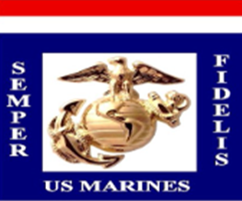Four Tier Approach
The Marine Corps Civilian Leadership Development Program (MCCLDP) is a congressionally mandated and Commandant of the Marine Corps (CMC) directed leadership development program providing selected federal employees of the Marine Corps an opportunity to participate in those activities that meet DoD certified leader competencies and emphasize Marine Corps core values of Honor, Courage and Commitment. The program design is built around a four-tier approach that ensures all eligible federal employees have access to participate in the program.
 The four-tier approach provides the Marine Corps with a comprehensive program that maximizes its investment in the total civilian workforce. Tier-four courses are formal certified leadership courses provided by government and public institutions emphasizing interagency participation; faculty led seminars which emphasize student participation activities and testable learning outcomes for students to demonstrate knowledge and application. Marine Corps federal employees are nominated to attend by their command’s and selected by the Lejeune Leadership Institute (LLI) to participate in these courses. A limited number of federal employees have the opportunity to participate in Tier-four courses because of the costs associated with tuition, travel and time away from their primary duties.
The four-tier approach provides the Marine Corps with a comprehensive program that maximizes its investment in the total civilian workforce. Tier-four courses are formal certified leadership courses provided by government and public institutions emphasizing interagency participation; faculty led seminars which emphasize student participation activities and testable learning outcomes for students to demonstrate knowledge and application. Marine Corps federal employees are nominated to attend by their command’s and selected by the Lejeune Leadership Institute (LLI) to participate in these courses. A limited number of federal employees have the opportunity to participate in Tier-four courses because of the costs associated with tuition, travel and time away from their primary duties.
The Tier-three Leader Development Seminars are developed and delivered by the LLI, Marine Corps University (MCU) to Marine Corps installations world-wide. These seminars form the Leadership Certificate of Excellence that incentivizes employees to attend and complete the program of study. The seminars use the DoD leadership competencies; parallel the DoD Leader Development Continuum and address Marine Corps core values as the focus of seminar learning areas and educational objectives. Like Tier-four courses, the Tier-three seminars actively engage students through seminar discussions led by MCU certified seminar instructors; graded Pre-seminar study, in-seminar work, and post seminar individual and group activities that measure students’ understanding and application of leadership competencies stressing leadership effectiveness. The importance of these seminars defines a real investment in developing the Marine Corps civilian workforce through an extensive outreach network ensuring employee access.
Tier-two classes support leader development priorities defined by Marine installation commanders addressing specific leader challenges identified within their commands. These off the shelf commercial classes give commanders the ability and flexibility to address identified leadership development gaps with a realistic engagement plan to build stronger leaders in their workforce.
To support tiers two through four participation and effectiveness, Tier-one leader development modules offer the basic knowledge necessary to begin and complete a successful leader learning program. The modules provide the encyclopedic and technical terminology students require to successfully navigate through ever-increasing levels of leader development complexities.
Participation in the MCCLDP is managed by LLI in cooperation with Manpower and Reserve Affairs (MPC-30) and Marine Corps Installation Civilian Leader Development Administrators (CLDA).
The learning outcomes for the varied leadership development venues ensure DoD leader competencies and Marine Corps core values are adequately stressed and reinforced throughout Marine Federal Employees’ careers. The MCCLDP design provides a reasonably funded program that offers approximately 13 percent of the workforce an annual opportunity to grow their leadership potential.
The end state of the MCCLDP ensures that those employees who complete the program possess the competence, confidence, and competitiveness demanded in the challenging global environment of the 21st century.